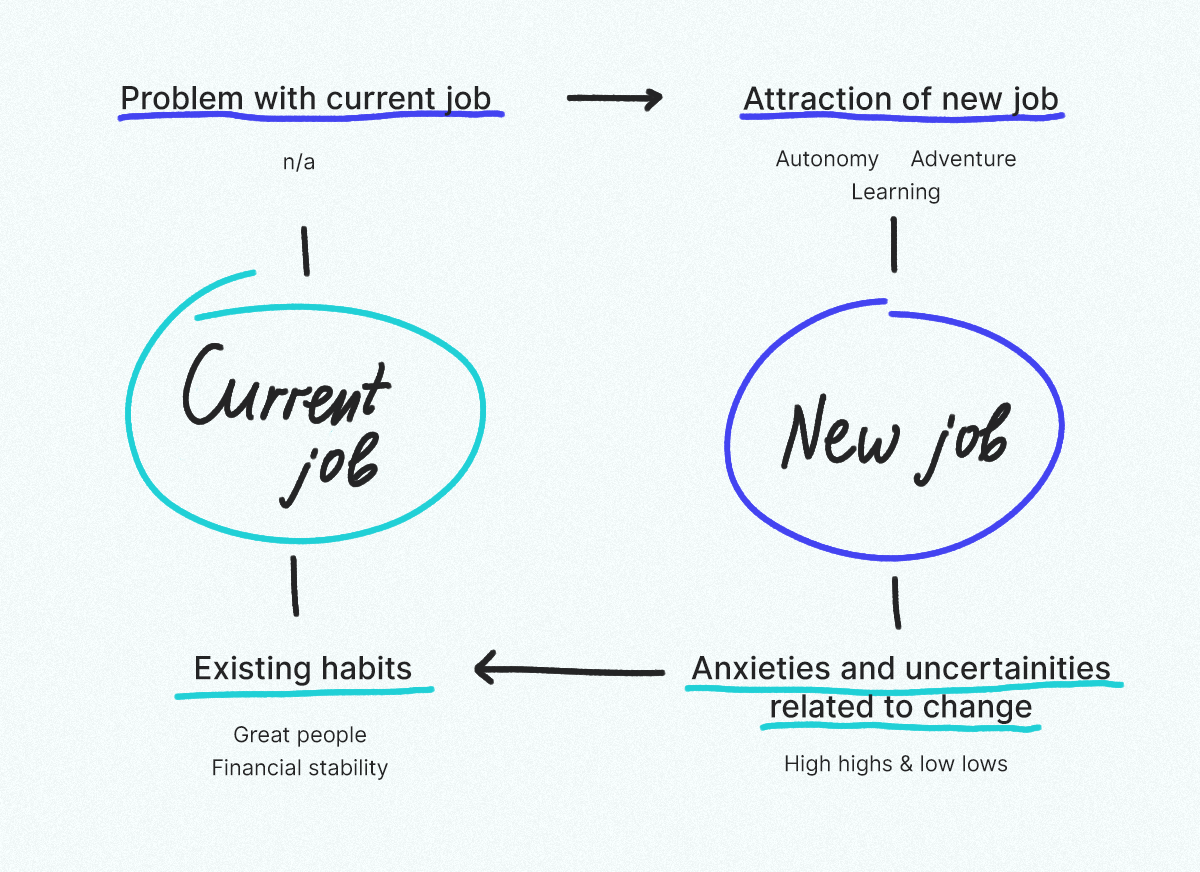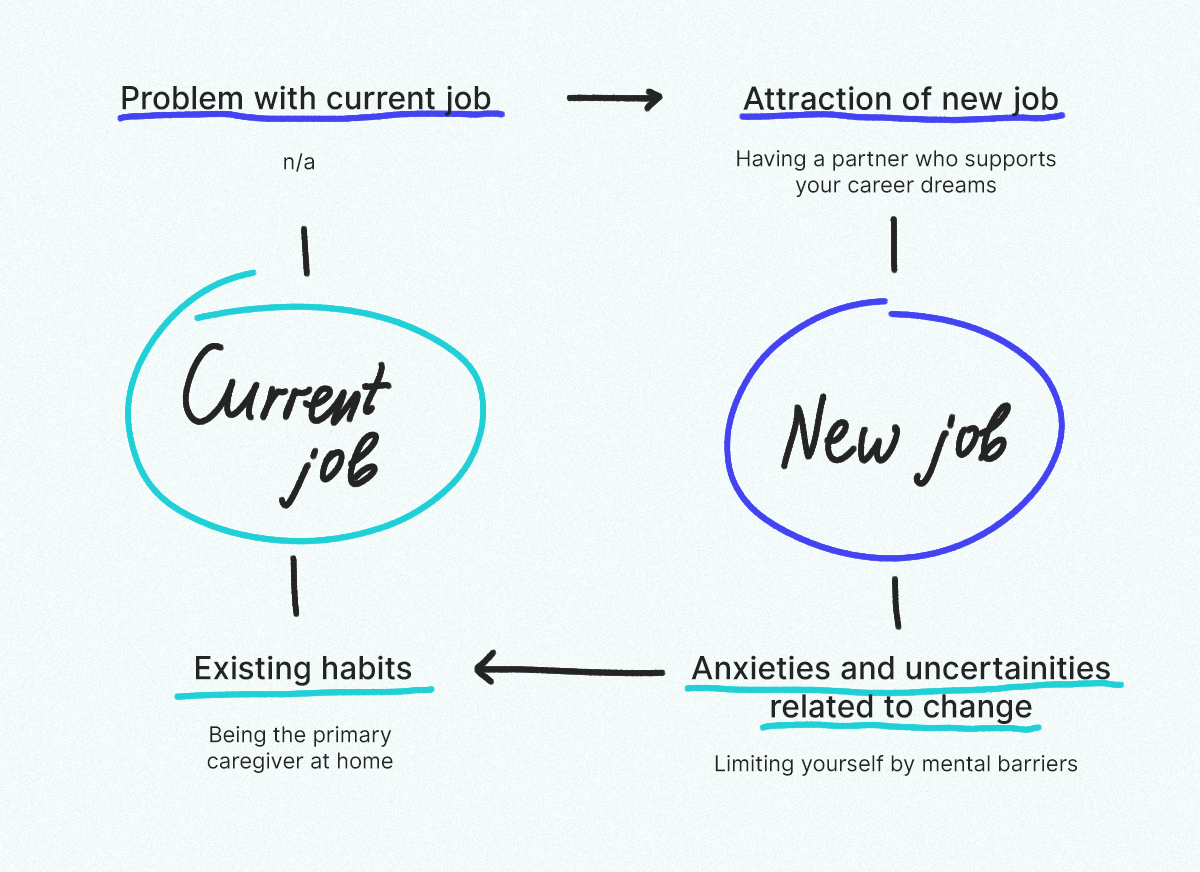Strong leadership in a company is what attracts me to a new opportunity like no other. Adventure, autonomy, learning are high on my list of must-haves, too.
These reflect my values, my approach to life and career growth, and my personality. Yours might be similar or completely different. It depends on your current stage of life, context, priorities, values, and long-term objective. Not everyone thinks about their career as an adventure, for example.

While most of us care about the same things, they are important to us to a different degree and have a different priority in our hearts and minds. Women, men, and non-binary people often care about stability (emotional, financial), career Growth, learning and professional development opportunities, convenient commute, company culture and work environment, benefits, salary, leadership, recognition, and social activities with colleagues. These features act as minor or major forces when making the decision to stay or leave.
It’s a perception of existing problems and habits with the current situation, as well as a mix of exciting things related to the new opportunity, but also the blurriness and uncertainty of the new that brings anxieties.
But there seem to be a few more things at play when women make a decision to stay or leave that men tend to consider less often or to a lower degree For instance, being the primary caregiver, having a partner who supports your dreams, limiting yourself by mental barriers.
While you can’t necessarily change all of them, you can work with them, possibly re-negotiate, or at least be aware with them and accept them so you can choose the most appropriate path for yourself.
Three of those reasons, that you can call forces or factors too, that make women stay or leave a job.
1. Being the primary caregiver
The majority of men around the world don’t take paternity leave, even when they are legally entitled to it. 82.4% of single parents are females in Australia. It’s usually women who leave work and become the stay-at home parent to avoid the constantly increasing child-care costs; the phenomenon is often covered by UK and Irish media. Across Europe, between 11% and 81% think that the most important role of a woman is to take care of her home and family. Caring for aging parents in the U.S. falls mostly on women as they represent 55% of family caregivers.
Globally, women are expected to be the primary caregiver.
For instance, I’m in a privileged position compared to most of the women in the stats above.
I have a sister, but I don’t live in the country where my parents live, so looking after my parents when they grow old wouldn’t automatically fall solely on my shoulders.
I have a girlfriend, so having a child wouldn’t automatically be the responsibility of the mother, as there would be two mothers.
I’m grateful for both of those. It allows me to develop my career, to move countries, and these are valuable to me.
Ask yourself these simple yes-or-no questions:
- Are you the primary caregiver in your family?
- Are you okay with this?
- Does it affect your career?
- Can you negotiate around this?
It’s important to be aware if being a primary caregiver is something that does or doesn’t affect your career choices, so you can better understand what forces are part of your individual, unique mix in your equation when deciding whether to stay or leave a job.
2. Having a partner who supports your career dreams
I feel lucky having a partner who supports my dreams. We both dream big. This relationship dynamic not only encourages me to dream big regularly, but to also pursue the things I want. She said “I believe that you can make it” and that’s how I started Vessy.com – my career coaching and writing on the side.
I wasn’t always in this type of relationship. I have experienced being the one who pushes, who dreams for both of the people in the relationship, without necessarily getting encouragement for my personal pursuits. I actually used to push too much.
I do prefer a relationship of two dreamers, achievers, co-leads. It suits my personality and attitude. But that may not be the right fit for everyone, and that’s the point.
It’s completely individual. I’ve observed that some people want to lead, others want to follow.
Again, ask youself a few yes-or-no questions:
- Does your partner support you to pursue your dreams, big or small?
- Do you need a partner who does that?
- Do you need to change anything in the dynamics of the relationship so it works better for both of you?
Your partner’s opinion doesn’t just matter, it’s a huge factor and one of the major reasons for people to decide to stay or leave their role. And it’s critical that you acknowledge its power and direction.
I often think about the career change Sam did. She decided to leave her job in investment banking to join Spotify as Senior Director of Content & Creator Marketplace Operations. It was the support of her wife that encouraged her to walk away from a banking job that she didn’t thoroughly enjoy.
If you had your partner’s unlimited support, and money and time were not an issue, what would you really love to be doing? Put it down. Now compare it to the things you are actually pursuing.
Many of us strive for less than what we actually dream for. And there’s a reason for it.
3. Limiting yourself by mental barriers
“No, I don’t sabotage myself. I know I’m worthy of loving. I know I deserve to be happy. I know I’m capable of achieving and being successful.”
I used to say that up until a week ago, when I was reading a book called “The Big Leap”. Then, it reminded me about my upbringing and made me think about how it affects my choices today.
I was brought up in a family that values culture, art, education, not a big salary, a big house, and expensive things. I always felt that pursuing a lucrative position or creating a billion dollar company would cross an unspoken rule – in our family we don’t do “shallow” things for a living. My first job was in advertising and although my parents never told me they were disappointed, I could feel that they perceived it as a less of an important professional pursuit.
They never told me or expected me to be an artist or a teacher or a doctor, and I always made my own choices. It has been incredible to be the one who chooses.
Yet, I realize that while I was staying true to myself in my career choices, I was going for something that doesn’t cross that unspoken rule too much. I’d have a well paying job, I’d build a career, but I wouldn’t have the most highly paying job or I wouldn’t dream of creating a billion dollar company, maybe a small one far in the future.
What limits me is me. For now.
Being aware of what mental barriers you’re dealing with will allow you to dissolve them, remove them, so you can operate in your state of full potential and expand it every time you reach another barrier.
Yes, there’s a gender gap in pay, promotions, leadership roles, funding in the US and beyond. Men are promoted based on potential, while women are promoted based on past accomplishments, according to McKinsey’s report from 2011. The same biases affects funding; Harvard Business Review reported that Venture Capitalists referred to male entrepreneurs as “young and promising”, while female ones as “young, and inexperienced”. That’s how
- Female founders got 2% of venture capital in 2017
- The average salary for females in the US was 79% of the average male in 2016
- 4% of CEOs of Fortune 500 companies CEOs are women
We’re underpaid, we’re underinvested in, and we’re passed over for promotions – the glass ceiling is real.
But very often, way too often, women don’t even get to the glass ceiling because of ourselves, because of our own upper limit problems.
That means that I am working against myself. You could be against yourself and you probably don’t know it.
Maybe you worry or feel guilty about outshining your siblings? Or maybe you think you’re not flawless and you don’t deserve to be successful?
Everyone experiences pressure and deals with expectations from partners, family, and society to a certain degree. But let’s be honest, people are more flexible in their expectations from men, while they are very specific as to what a “good” wife, mom, daughter, boss looks like.
So while we juggle everyone’s expectations without compromising our careers, we’re also dealing with our own upper limit problems and they are the toughest to tackle.
Instead of questions, I have an exercise for you this time:
- Write down all the people who have a strong impact and/or a key role in any aspect of your life.
- Answer this question for each of those people: In my relationship with .. what do I need to say or do to feel complete and whole?
- Question yourself if you listed everything. Think of the unthinkable. What conversations are you trying to avoid whatever the reasons? Just put them down, only you are to look at it, so it’s a safe space.
- Put down what’s stopping you to have those conversations
- Every week pick one of these and have that conversation

Like it or not, being a primary caregiver, having a partner who supports your dreams, and how much your own mental barriers may limit yourself are all part of the equation.
It’s up to you to change the terms or keep them the way they are. But be sure to acknowledge the existence of those factors in your life, so you can be true to yourself next time you make the decision whether to stay or leave.
This piece was brought to you by the team at Enhancv, a SaaS startup built around a web platform for creating modern resumes.

